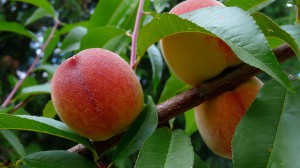More pesticide resistance found in U.S. crops
 Resistance to two more pesticides has been discovered in the United States, according to a recent study entitled “Field Strains of Monilinia fructicola Resistant to Both MBC and DMI Fungicides Isolated from Stone Fruit Orchards in the Eastern United States.” Growers began using the fungicides methyl benzimidazole carbamate (MBC) and demethylase inhibitor (DMI) to control brown rot disease on stone fruit in Pennsylvania, Maryland, and South Carolina. Last year, growers noticed an increase in brown rot infection despite the continued spray of fungicides. Upon investigation, researchers found that the infections were due to the recent development of resistance to both MBC and DMI by a large number of Monilinia fructicola strains, the fungus responsible for brown rot disease. Specifically, researchers discovered 22 M. fructicola strains resistant to both fungicides, including four strains from peaches in South Carolina, 12 strains from peaches and sweet cherries in Maryland, and six strains from sweet cherries in Pennsylvania. This research reinforces that synthetic pesticides cannot be viewed as long-term solutions to pest control. Integrated pest management techniques are better suited for continuous control of insects and diseases, even without the use of dangerous chemicals.
Resistance to two more pesticides has been discovered in the United States, according to a recent study entitled “Field Strains of Monilinia fructicola Resistant to Both MBC and DMI Fungicides Isolated from Stone Fruit Orchards in the Eastern United States.” Growers began using the fungicides methyl benzimidazole carbamate (MBC) and demethylase inhibitor (DMI) to control brown rot disease on stone fruit in Pennsylvania, Maryland, and South Carolina. Last year, growers noticed an increase in brown rot infection despite the continued spray of fungicides. Upon investigation, researchers found that the infections were due to the recent development of resistance to both MBC and DMI by a large number of Monilinia fructicola strains, the fungus responsible for brown rot disease. Specifically, researchers discovered 22 M. fructicola strains resistant to both fungicides, including four strains from peaches in South Carolina, 12 strains from peaches and sweet cherries in Maryland, and six strains from sweet cherries in Pennsylvania. This research reinforces that synthetic pesticides cannot be viewed as long-term solutions to pest control. Integrated pest management techniques are better suited for continuous control of insects and diseases, even without the use of dangerous chemicals.

